
The Saint and the Devil
December 18, 2013On a cold and dreary day I sit in front of the computer and ponder, why the words adulation and flatulation have such vastly different meanings and if there could be a content, where these two words, which rhyme perfectly, could be used meaningful side by side.
Yet, as this particular question seems to be too complicated to solve at the moment, I turn to another issue, much easier to understand and more clearcut (at least according to Western journalists). The chosen issue is a comparison of Nelson Mandela (the saint) with Robert Mugabe (the devil).
About the saint:
Nelson Mandela was one of the bright shining stars of goodwill and kindness, he was the personification of peace, mercy, and racial harmony. His passing at the age of 95 has been commemorated by media enterprises all over the world with hundreds of documentaries and thousands of eulogies, comments, reflections, and tributes.
He was a true saint of the 20th century. Don’t get me wrong, I may have a cynical disposition, but in this case I mean it, when I write that he was a true saint!
A man who is caged in gruesome, debilitating, humiliating conditions (Robben Island, Victor Verster prison) for 27 years and nevertheless has not lost his charisma and his ability to smile, a man who despite all his trials is still able to radiate joy, grace, encouragement, and generosity, such a man rightfully deserves to be called a saint.
A true saint he was, but not without imperfections and weaknesses. After all, Nelson Mandela was not a religious myth, not an esoteric figure, not a metaphysical construction, he was human. Most of the published adulations omit the flaws, most are superficial, trivial, ignorant, and completely miss the point. They are of a quality, which ultimately and definitively answers my question of the first paragraph — at least I don’t have to ponder about that anymore.
(The shallowness of coverage is not surprising. After all, the duty of mass media enterprises is to make profit, to please the owners, to keep the populace sedated, it is not their mission to educate and inform.)
Only a few articles dig a little bit deeper, I mentioned some of them already in the December link list under the rubric “Beatification and canonization news”. As Mandela is now laid to rest in Qunu and the mass media infatuation (another rhyming possibility) slowly subsides, a few more sane minds (most notably Danny Schechter and Greg Palast) come out of the underbrush where they took cover, to issue more measured and balanced opinions and apprehensions.
To put matters into the right perspective one needs to keep in mind, that the USA and all other Western nations viewed the ANC and Mandela as terrorists. In August 1962 CIA officer Donald C. Rickard gave the South African police detailed information about Mandela, who had been on the run for 17 months. It was only this information which made Mandela’s arrest and subsequent imprisonment possible.
http://www.thirdworldtraveler.com/Blum/CIAMandela_WBlum.html
The ANC was perceived as a terrorist organization and Nelson Mandela was kept on the US government terrorist list until 2008. President Ronald Reagan vetoed sanctions against the Apartheid regime. The International Freedom Foundation, an Afrikaner lobby group, was supported by Senator Jesse Helms, Senator Jeff Flake, and many other prominent Republicans (Grover Norquist, Jack Abramoff, William F. Buckley).
The Apartheid regime in South Africa was sponsored and avidly defended by the West until it was about to crumble because of massive corruption, hardcore military spending, and exploding social unrest in the townships.
The 36,000 Cubans who defeated South African troops in neighboring Angola (Cuito Cuanavale) were ready to move into South Africa. The Vietnamese who had defeated the mighty USA were advising the ANC’s military wing, and an international embargo, leaky though it was, laid siege to South Africa’s economy.
A change was inevitable, but the Western strategists successfully used a scheme (the same as in the Philippines after Ferdinand Marcos) which enabled a political transition under the condition that no social transition occurred. The scheme included carrots and sticks; carrots were international investment and loans, sticks were white flight (withdrawing of capital) and economic isolation.
The scheme included also attempts, to win over, co-opt, or bribe black leaders. Two years before Mandela’s release the ANC in exile had, in effect, done a deal with prominent members of the Afrikaner elite at meetings in a stately home, Mells Park House, near Bath. Mandela was in fact not only pressured by Western politicians and experts, he was also pushed by a neoliberal faction within his own party.
When Mandela attended the World Economic Forum Davos in 1992, it was with the intention of explaining to those present why nationalization was the right approach for South Africa. But in a series of conversations with other world leaders he was persuaded to support an economic framework based on globalization and neoliberalism from the cookbook of Milton Friedman.
The plans of nationalizing gold mines and banks — owned by Western capital (UK based Anglo American/DeBeers), and distribute the benefits to the indigenous population, were abandoned. Mandela appointed Derek Keys, de Klerk’s finance minister as his own, and kept Chris Stals, a conservative former member of the Broederbond, on the Reserve Bank. Derek Keys successor was Chris Liebenberg, a white banker.
The ANC government consequentially continued existing economic policies of fiscal restraint (to avoid inflation), of an independent Reserve Bank, trade liberalization, and co-optive labour policies. Redistribution was not a priority, it was also not further down the list, it was simply not on the menu anymore.
The original “Reconstruction and Development Program” was cancelled and replaced by GEAR (Growth, Employment and Redistribution), which despite the misleading title was just a finance strategy approach, cheered by banks and corporations. The IMF gave a loan of 850 million US$ under the usual conditions: Fiscal austerity, market liberalization, privatization.
The eminence of free enterprise and property rights were enshrined in every major economic policy statement and the constitution itself, neoliberal compradorism became the dominant phenomenon within the ANC elite, safeguarding international financial interests and protecting white ownership of land, mines, and vital industries.
It is worth noting that the statue of Nelson Mandela at the South African Embassy was paid for by the same corporations that initially supported Mandela’s imprisonment, including Anglo American, South African Mining Group, South Africa’s Synthetic Fuels, chemicals giant Sasol, the South African Gold Coin Exchange, and Standard Bank.
The black and white elites not only conspired to keep economic Apartheid in place, they exported it also to Mozambique, where, with support of the ANC, a policy of land expropriations paved the way for the establishment of white Afrikaner farms using local farm workers. Since then white agribusiness continuously extended its reach into other African countries (Angola, Tanzania, DRC) with large scale investments in commercial farming, food processing and eco-tourism.
Nelson Mandela thought that he had no chance, he took what was on the table, believing, that in the end his people would benefit and social change would come automatically (trickle down effect) out of economic progress and property.
What a terrible miscalculation!
The miserable life of the poor majority broadly remains the same as under apartheid. With 25 percent unemployment (52 percent youth unemployment) and a Gini coefficient of 63.1, poverty remains high. Inequality remains high as well — the average white family has six times the income of a black family. Life experience is 53.4 years and the country is on place 121 (out of 190) in the UNDP’s Human Development Index. There are also the problems of a high crime rate and a devastating HIV/AIDS epidemic.
In the face of such statistical data one could easily come to the conclusion that the main change in comparison with the old Apartheid regime is that the old white ruling class is joined by the new black elite.
The curse of natural resources
Gold and diamond production is declining because of intensive exploitation, but South Africa remains a cornucopia of mineral riches. It is still the world’s largest producer of chrome, manganese, platinum, vanadium, and vermiculite, and the second largest producer of ilmenite, palladium, rutile, and zirconium. It is also the world’s third largest coal exporter and a huge producer of iron ore. Nearly 460,000 South Africans work in the mines.
These are low payed, unhealthy, and risky jobs. The living conditions of the men who work in the mines are miserable almost beyond imagination. They have to go down as deep as four kilometers beyond the surface, they have to endure temperatures up to 60 degrees Celsius (140 degrees Fahrenheit) and humidity close to 100 percent. Many miners suffer from bronchitis, asthma, bleeding from bodily orifices, impotence, many die young from cancer and lung diseases (silicosis, pneumoconiosis).
An estimated 60,000 mine workers have been killed through mine accidents and more than one million were permanently disabled since 1900.
430 miners died 1960 in Coalbrook
64 died 1983 in Hlobane
29 died 1985 at Middelbult mine
177 died 1986 at Kinross mine
53 died 1993 at Middelbult mine
104 died 1995 at Vaal Reefs mine
In 2012 34 miners were shot dead by police during a strike in Marikana against British platinum producer Lonmin. In September 2013 80,000 gold miners went on strike.
The global view
South Africa is only one example of the global rush to exploit the remaining riches under the surface (mineral and fossil fuel deposits). The Western consumers insatiable appetite for new goods and the energy intensive lifestyle of Western societies make it necessary to achieve control of all exploitable regions. The plight of local population is of nobodies concern.
The local elites are indoctrinated in Western elite schools like Harvard and Yale, the political leaders are bribed — every man has his price. The incorruptible leaders are taken care of in one way or the other (Allende, Aristide, Gaddafi, Chavez).
Haiti fell, Libya fell, Syria still holds firm but is devastated. Somalia and the DRC are failed states, everywhere else Western cronies rule and sell out their countries to the worlds big corporations.
French troops are on the march in Mali and the Central African Republic, in 2011 France intervened in Ivory Coast.
Only a few countries have escaped the global onslaught and kept their independence. In Latin America there are Cuba, Venezuela, Ecuador, Bolivia, to some extent Argentina. In Africa there is Zimbabwe, Zimbabwe is the lone holdout.
About the devil
After Mandela was released from prison he had countless meetings with political leaders around the world, who explained to him that if white flight occurred, his country would mimic Zimbabwe’s fate. Which was: Being isolated, outlawed, broke, on the verge of collapse.
It was explained to him, that the international community (of Western countries) would not take kindly attempts of nationalization and redistribution, he was warned that instability, chaos, lawlessness, even a bloodbath could ensue from attempts to change the existing social fabric.
Mugabe’s leadership was the bad example and Mandela had to avoid Mugabe’s mistakes.
Nelson Mandela enjoyed a long friendship with Robert Mugabe. Both attended Fort Hare University in South Africa. Both served long prison sentences and were seen as their countries’ liberators.
Mugabe led his country to freedom like Mandela did, but when he distributed the big landholdings of white farmers to poor blacks, he was condemned, vilified, demonized. The West imposed stringent economic sanctions (Section 4 C of ZDERA, which blocked financial assistance from international lending institutions), which are still in place, and tried to destabilize the government with the usual methods (NGO’s on a humanitarian mission, economic sabotage, corruptible politicians like Morgan Tsvangirai).
Land Reform
In 1980 white farmers, who made up less than one percent of the population, owned 70 percent of the most valuable farming land.
This has changed significantly, and nearly 14 million hectares land have been redistributed from white colonial settlers and their descendants to the black majority. Since 2000, the Mugabe-led government embarked on a fast-track land reform program to forcefully correct the inequitable land distribution created by colonial rule. Mugabe initially opposed farm takeovers, but war veterans who until then had failed to benefit from their liberation war service spontaneously occupied some 6,000 white-owned farms in defiance of the government.
Recent studies reveal, that the land distribution was mostly successful with solid agricultural production happening on the new smallholder farms (plots of between five and 10 hectares) and that substantial surpluses are being produced. 170,000 new farm owners have provided employment for more than one million people (the new farms are less capital intensive but more labour intensive). There is also significant investment in the new land, including the clearing of plots, the purchase of farm assets, the digging of wells. New homes, schools, roads, and dams have been built. Nearly all of this has been done by the new settlers themselves with only little outside assistance.
Small grain and edible bean production has increased, but cash crops like cotton and tobacco (for Chinese smokers) have also boomed, which is not a desirable development, because it increases deforestation and economic dependency.
While South Africa’s economy remains white- and Western-dominated, Zimbabwe is taking steps to indigenize its economy, placing majority control of the country’s natural wealth and productive assets in the hands of blacks. In 2008 Robert Mugabe signed the “Indigenization and Economic Empowerment Bill”, which enables Zimbabweans to take over and control many foreign owned companies. In the long run 50 percent of all the businesses in the country shall be transferred into local black African hands.
Especially bothersome for the West are Mugabe’s plans to ban raw mineral exports as well as indigenize mining companies like Canadian-owned New Dawn Mining and Zimplats, a subsidiary of platinum-mining multinational Implats.
Despite Western propaganda claims, that Mugabe has driven Zimbabwe’s economy into collapse, the economy is actually booming and doing better than most other African nation. This is mainly due to China’s growing economic influence and to soaring mineral prices.
World Bank economists called it an “amazing” recovery and US-think tank CATO institute was left head-scratching and clueless, stating in an analysis:
“Since 2000, Zimbabwe has consistently earned the rank of one of the world’s least economically free countries….Among the reasons for Zimbabwe’s bottom rank are its poor property rights protection, high tariffs on imports, an increasingly bloated state sector, great difficulty in starting a business, and onerous regulations regarding hiring and firing….Zimbabwe is thus a curious outlier that requires further investigation….Zimbabwe’s rapid GDP growth and poor business environment appear to be a paradox.”
It seems, that some disciples of neoliberalism actually believe in what Milton Friedman and the Chicago gang of economics were preaching.
The national elections in Zimbabwe in July upset the West when President Robert Mugabe and his ruling ZANU-PF party swept the executive and legislative polls. Despite the monitoring and subsequent endorsement of the elections by the African Union and SADC, (the regional Southern African Development Community), USA and Britain maintain their draconian sanctions against the country.
A few more (and maybe unexpected) details about the devil:
In 2008 Zimbabwe had a literacy rate of 90 percent, the highest in Africa. Mugabe always prioritized education, which is not surprising, because while Mandela was a lawyer, Mugabe was a teacher, who’s interest in learning and teaching became manifest already in his early youth, when he spent most of his time reading in the school’s libraries. Mugabe’s brother Donato once said, that “Robert’s only friends are his books.”
Robert Mugabe has probably the highest academic credentials of all world leaders. In addition to a Bachelor of Arts degree from Fort Hare he earned five other university degrees by correspondence courses during his eleven year imprisonment, and a seventh one while he was already president.
His prison conditions where not as harsh as Robben Island but when his three-year-old son Nhamodzenyika died from malaria in Ghana in 1966 and Mugabe petitioned the prison governor to leave on parole to attend the funeral he was refused permission by then Prime Minister Ian Smith.
Robert Mugabe was not always depicted as an evil dictator, he was even on the short list for the 1981 Nobel Peace Prize. When he won Zimbabwe’s first election, he renounced retribution against whites. “Our people, young and old, men and women, black and white, living and dead, are, on this occasion, being brought together in a new form of national unity that makes them all Zimbabweans.”
Mugabe’s general viewpoint was, that a just and eqalitarian society could not be built on the foundations of the past and that a new social order, based on subsistence and peasant values, had to be constructed, yet he made important (and contentious) concessions in the negotiations with the white rulers. He accepted a “willing buyer, willing seller” plan for land reform, he allowed 20 seats in the new parliament to be reserved for whites, and he agreed to a ten-year moratorium on constitutional amendments.
In November Thabo Mbeki, Mandela’s successor, revealed in an interview, that “There is a retired chief of the British armed forces who said he had to withstand pressure from the then prime minister of the United Kingdom Tony Blair …. Tony Blair who was saying to the chief of the British armed forces, ‘You must work out a military plan so that we can physically remove Robert Mugabe.’”
A few last words to close this comparison of Mandela and Mugabe: Nelson Mandela was a good friend and admirer of Muammar Gaddafi and he was a friend of Fidel Castro Ruz, During a visit to the USA in 1990 he severely upset his host by praising Fidel Castro, PLO chairman Yasser Arafat, and Muammar Gaddafi as his “comrades in arms”, saying: “There is no reason whatsoever why we should have any hesitation about hailing their commitment to human rights.”
Nelson Mandela was indeed on the right side of history and despite the shortcomings of South Africa’s transition he deserves the unanimous praise from every corner of the mass media world.
One only wonders, what Western media will write, when Robert Mugabe dies.
P.S.: This text could only scratch the surface and many interesting details had to be omitted (for instance Mugabe’s humble origin, his religiosity, and his gay bashing or that facts, that Mandela divorced his first wife after falling in love with Winnie Mandela and that he was troubled by severe marital problems after his release from prison).
Behind every great man there’s a great woman, and as the women in both persons life shaped their husbands personality probably more than anything else, these women’s own life stories truly deserve to be told. It could not be done in this text but a sequel with their stories will follow as soon as possible. For the time being, consider this:
The memorial service for Nelson Mandela at the FNB Stadium in Soweto was attended by leaders from over 90 countries, When the speaker (ANC deputy president Cyril Ramaphosa) announced, that Mugabe had entered the stadium, Zimbabwe’s President was greeted by thunderous applause, making the reception of most other dignitaries seem to be lukewarm in comparison. There was only one person who enjoyed similar acclaim and cheers from the audience: It was Winnie Mandela.
Further reading:
http://snoopman.wordpress.com/2013/12/19/the-audacity-of-obama-a-black-wolf-in-corporate-clothing/
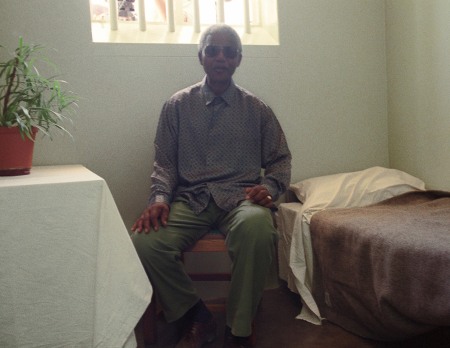
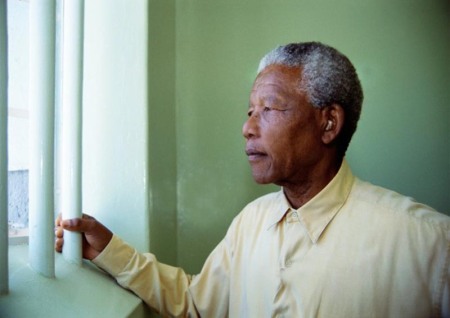
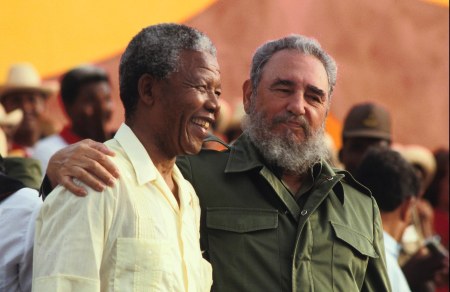
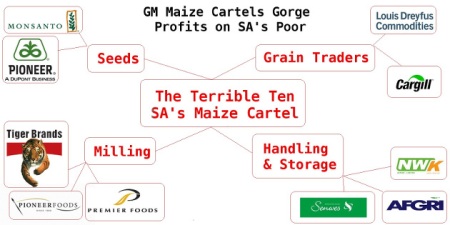
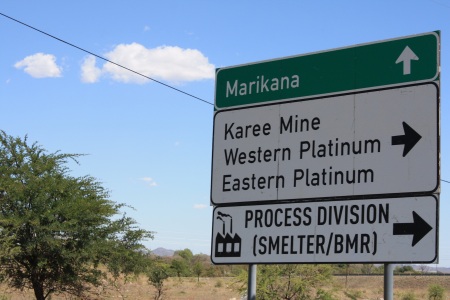
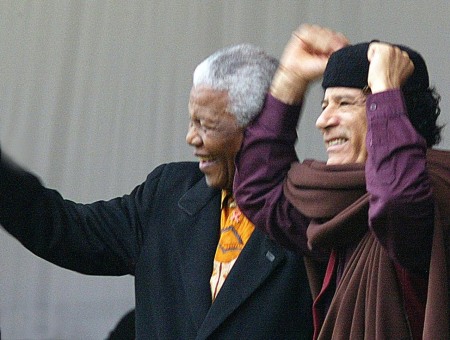
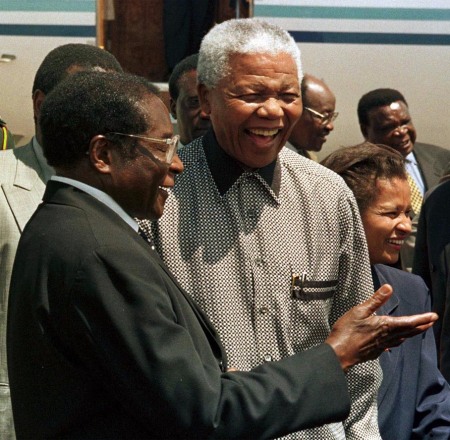
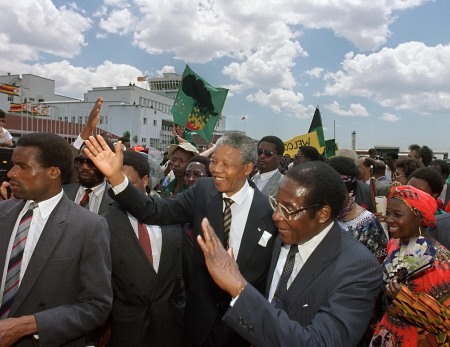
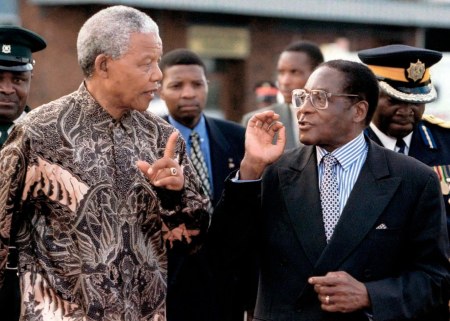
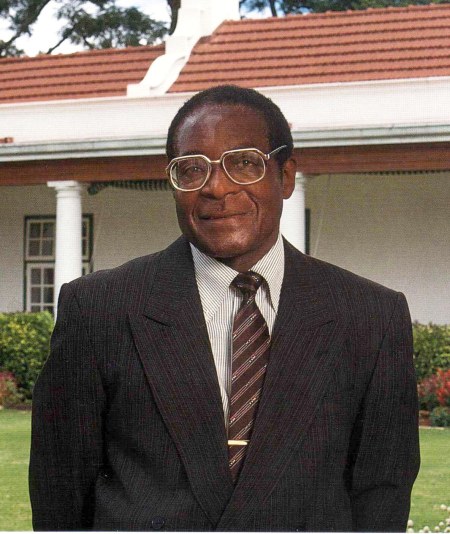
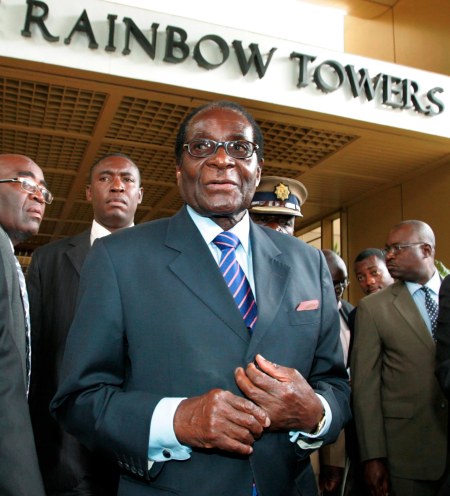
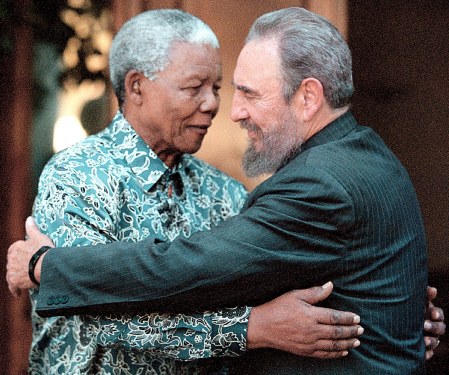
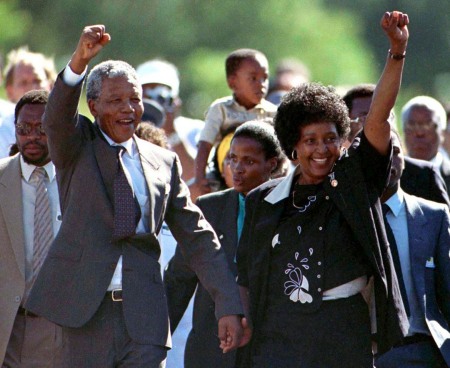
Well written article
LikeLike
[…] https://mato48.com/2013/12/18/the-saint-and-the-devil/ https://mato48.com/2014/02/04/china-key-to-africas-optimism/ https://mato48.com/2014/04/15/rwanda-and-the-media-brainwashing-of-western-minds-rtf/ […]
LikeLike